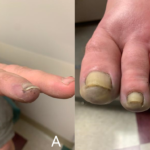Third, the use of immunosuppressives has as yet had little effect on disease manifestations. However, research showing possible direct effects of aPL (e.g., neuronal tissue) and the increasing anecdotal experience of success in APS with new agents such as rituximab may stimulate a reappraisal.
Summary
This review highlights some of the clinical and diagnostic aspects of APS, or Hughes Syndrome. With recognition of the syndrome spreading to all disciplines of medicine, the clinical approach to many diseases is changing. APS is proving a differential diagnosis in diseases such as multiple sclerosis and Alzheimer’s disease and in clinical research it is providing insights into mechanisms of hypertension and accelerated atheroma. In the world of lupus, the recognition of APS has had a profound impact both on diagnosis and on treatment.
Dr. Hughes is head of the London Lupus Centre and London Bridge Hospital.
References
- Hughes GRV. Thrombosis, abortion, cerebral disease and lupus anticoagulant Brit Med J. 1983;287:1088–1089.
- Hughes GRV. Hughes Syndrome The antiphospholipid syndrome. A historical view. Lupus. 1998;7:1–4.
- Harris EN, Gharavi AE, Boey ML, et al. Anticardiolipin antibodies: detection by radio immunoassay and association with thrombosis in SLE. Lancet. 1983;2:1211–1244.
- Hughes GRV. Migraine, memory loss and ‘multiple sclerosis’. Neurological features of the antiphospholipid (Hughes) syndrome. Postgrad Med J. 2003;79:81–83.
- Cimaz R, Meroni PL, Shoenfeld Y. Epilepsy as part of SLE and systemic antiphospholipid syndrome (Hughes Syndrome). Lupus. 2006;15:191–194.
- Sletnes KE, Smith P, Abdelnoor M, et al. Anticardiolipin antibodies after myocardial infarction and their relation to mortality, reinfarction and stroke. Lancet. 1992;339:451–453.
- Hughes GRV, Phillips H.Mycophenolate mofetil and cardiovascular disease. Lupus. 2006;15 (supplement):1–3.
- Amigo MC, Garcia-Torres R. Kidney disease in antiphospholipid syndrome. Chapter in: Hughes Syndrome: antiphospholipid syndrome 2nd Ed. (Ed Khamashta MA). 2006 Springer, London.
- Stone JH, Amend W, Criswell LA. Antiphospholipid antibody syndrome in renal transplantation. Amer J Kidney Dis. 1999;34:1040–1047.
- Sangle S, D’Cruz D, Khamashta MA, Tungekar M, Abbs I, Hughes GRV. Goldblattt’s kidney, Hughes Syndrome and hypertension. Lupus. 2002;11:699–703.
- Sangle S, D’Cruz D, Jan W, et al. Renal artery stenosis in antiphospholipid syndrome and hypertension. Ann Rheum Dis. 2003;62:999–1002.
- Vasoo S, Sangle S, Zain M, Cruz D, Hughes GRV. Orthopaedic manifestations of the antiphospholipid (Hughes) syndrome. Lupus. 2005;14:339–345.
- Derksen RH, Khamashta MA, Branch DW. Management of the obstetric antiphospholipid syndrome. Arthritis Rheum. 2004;50:1028–1039.
- Lockshin MD. Autoimmunity, infertility and assisted reproductive technologies. Lupus. 2004;13:669–672.
- Hughes GRV, Khamashta MA. Sero-negative antiphospholipid syndrome. Ann Rheu Dis. 2003;62:1127.

